The graduate performance is the first milestone towards the MA or PhD degree in the department. It reflects our program’s longstanding commitment to aesthetic performance as a means of advocacy, social intervention, and creative inquiry. All PhD students in the department must present a 20-30 minute Graduate Performance. Typically, this milestone occurs at the end of the winter quarter of the first year of the program.
The development of the graduate performance begins during the Studies in Performance course (PERF_ST 410). The Graduate Performance can take many forms: it may be a narrative solo performance based on an original script or sourced from fictional or non-fictional sources (including material from student conducted oral histories or ethnographies); it can also be a non-narrative, gesture or movement-based program, a sound performance installation or an immersive performance.
What is expected is that in this milestone students engage performance as a method of inquiry and communication, building on expressive practices such as performed ethnography, documentary theater, practice-based research, performance installation, lecture performance and the like.
Peruse the archive of Graduate Performances below to consider what types of projects the department supports!
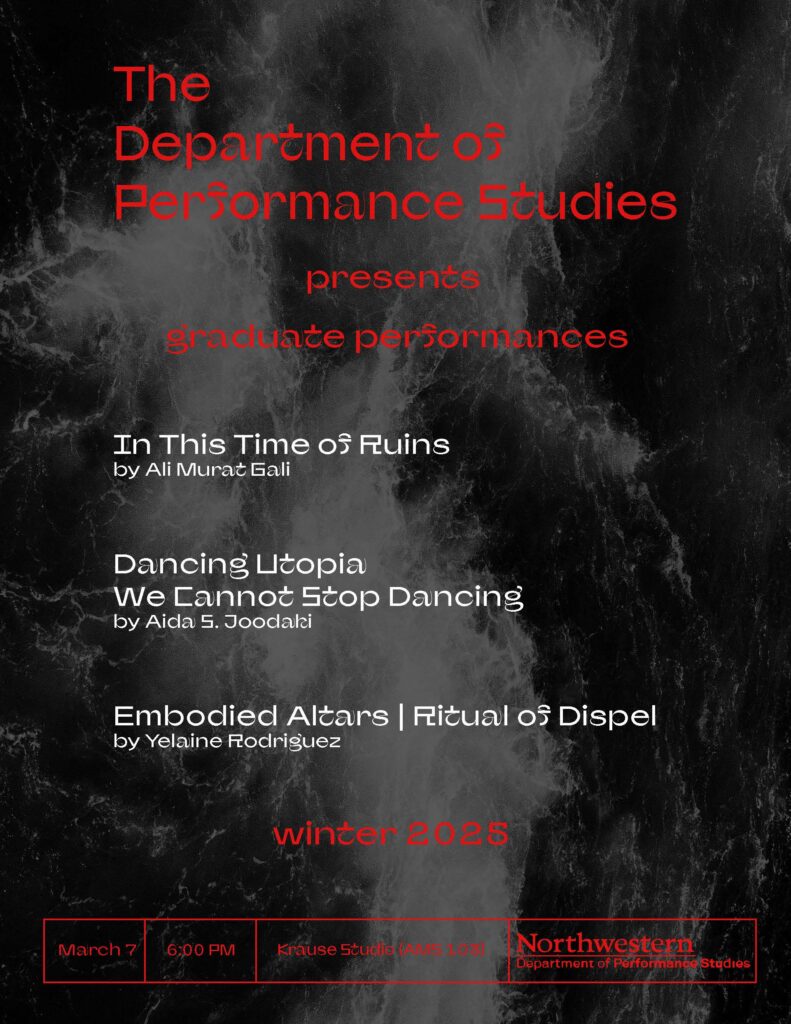
2025 Graduate Performances
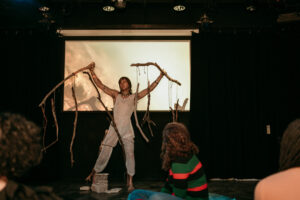
How might we live with the grief, the weights, the uncertainty of ruins?
What demands do ruins make on how we move, remember, and dream?
This multimedia performance connects the 2023 earthquake in Southeastern Turkey, the ongoing genocide in Palestine, and police and state violence in Detroit to
consider our present moment as a time of ruins.
Stretched between mediated representations of violence, compulsions of patterns, and horizons of wishing, the performance explores confusions, losses, and transformations that accompany an iterative choice of staying with the time of ruins. Through poems, songs, videos and images collected across Antakya and Detroit, Ruins is an invitation to question our collective responsibility as witnesses and those who act in the present to shape a future.
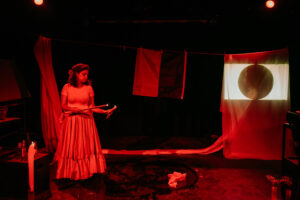
The concept of nationhood poses complex challenges and implications for Afro-ritual practices, particularly in the context of Dominican and Haitian relations. “Embodied Altars | Ritual of Dispel,” a multi-dimensional performance by Yelaine Rodriguez, critically investigates the detrimental effects of Dominican nationhood on the interrelations between Dominicans and Haitians, as well as on Afro-spiritual traditions across the island.
This performance intricately weaves together various Afro-syncretic religious practices, drawing on the rich cultural tapestries of Dominican and Haitian Vodou, Brazilian Candomblé, and Santería aesthetics. Accompanying the ritual is a video collage that incorporates archival footage from carnivals, alongside performances by Haitian and Dominican musicians from the (1980-1990s) and contemporary interpretations of
“música de palo.” This audiovisual component also documents acts of contemporary resistance, as well as the pressing political issues of migration and mass deportation affecting the region.
Moreover, the performance includes poignant testimonies from Dominicans of Haitian descent who have been adversely ffected by current Dominican deportation policies, thus highlighting the human impact of nationalistic frameworks. The ritual further engages with the historical context of the Haitian Revolution, situating it within the broader narrative of Caribbean nation-building.
Concluding the performance is an original poem by Afro-Dominican poet Kaila Bule, which serves as a call and response to ancestral work, invoking themes of liberation and healing for both the island and its diaspora. This performance ultimately functions as a ritual aimed at dispelling the legacies of colonization, promoting a process of learning and
self-decolonization through the lens of Afro-spiritual practices.
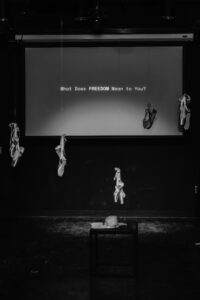
What does freedom mean to you?
This performance is the story of two women from different periods in contemporary Iranian history who were not allowed to dance because of cultural and sociopolitical factors and restrictive ideologies. Parvaneh and Nika narrate their stories through their shoes, movements, and historical background sounds. They envision a “Dancing Utopia” where freedom of expression reigns.
2024 Graduate Performances
2023 Graduate Performances

R and D is an exploration of the scraps left before the world-making capacities of performance – on our bodies, in our minds, in the studio, in the workshop, in the closet, and in the bedroom. Through an autobiographical analysis of my own dance rehearsal practices, the ballet Swan Lake, sexual play, sewing practices, and kinship ties, this work seeks to invite audience members into my own rehearsal practices so that we may defamiliarize what the “before” of performance does. Together, we will revel in the play invoked by the rehearsal space, thinking, dreaming, and dancing towards a something that is not-yet-here. As a product of my own practice of excess, this work takes pleasure in its status as a “bad” approximation of a live rehearsal, digital archive of stories, installation, ballet class, dance party, wardrobe fitting, and academic conference – it is quite literally too much and not enough. Through an appropriation of the scientific method, the work aims to demonstrate its rigor through satire while nodding towards the incommensurability of embodying process in the locus of performance.

“Enmity” renegotiates the role of fragmentation to diasporic subjectivity, complicating the recuperative impulse of the diasporic subject to enliven displaced stories, peoples, and affinities through family history. Tracing the affective resonances of familial estrangement, loss, and grief, this piece navigates the indeterminacy of (patri)lineage through a first-person narrative, focusing on several moments of rupture through which fracture and alienation materialize as an inheritance of their own. Questioning the symbolic function of family history to diasporic identity, “Enmity” invites the viewer to consider what can be made of a family that is damned.
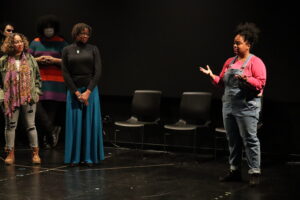
A participatory storytelling event exploring the pedagogical process of shepherding black girls into adulthood. Together we will investigate how we learn and from whom we learn, asking what are the stories and ways of telling stories we need/ed to learn from/to ourselves and each other.
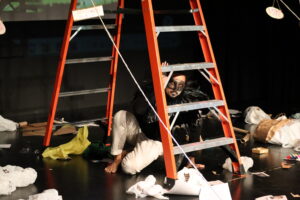
This participatory performance is based on anti caste literature, videos, images, aesthetics and interviews with anti caste activists. The Dalit body is compared with the body of vulture because the traditional occupation of caste oppressed is affiliated with flashes, bones, blood and sanitation. But the vultures who wait for atrocities, suicides, and all kind of violences on the caste oppressed and convert them into opportunities. You know already what you do but this time we will not shut our mouth. So, come pull the strings and feel the vulturing !
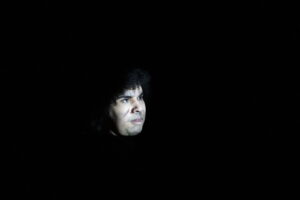
Still Living is a durational performance that explores the ethics of representation concerning enslaved subjects and histories through a post-memory/post-memorial lens. In this performance, I focus on the inevitability of failure regarding performances of history. Instead, I privilege tactics of stillness and sound as an act of transfer or the capacity to speak the unspeakable (Angela Davis, 1998) in that stillness and sound neither disrupts nor reduces history, but rather opens up space for possibility, imagination, and opportunities to grieve.
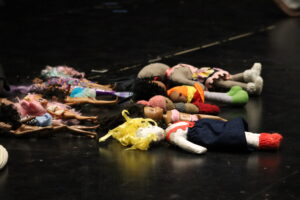
Still Living is a durational performance that explores the ethics of representation concerning enslaved subjects and histories through a post-memory/post-memorial lens. In this performance, I focus on the inevitability of failure regarding performances of history. Instead, I privilege tactics of stillness and sound as an act of transfer or the capacity to speak the unspeakable (Angela Davis, 1998) in that stillness and sound neither disrupts nor reduces history, but rather opens up space for possibility, imagination, and opportunities to grieve.